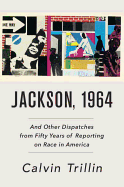
Calvin Trillin's 50 years of writing about race in the U.S. is as historic as a lunch counter sit-in and as current as today's tweets. In 16 pieces, published from 1964 to 2008 in the New Yorker, Trillin writes from experience, recalling Montgomery in 1961, "when men with clubs attacked first the press and then the Freedom Riders"; he started at Time's Atlanta bureau on the "seg beat," when journalists debated observing versus participating in the civil rights movement. Each piece ends with a brief update on the participants or the issue.
Trillin, the Nation's "deadline poet" and author of 30 books, is "a connoisseur of the smaller stories" that bring the specter of injustice into the reader's experience. He writes about Louisiana's "black blood law" that attempted a mathematical definition of race through Susie Phipps's long legal battle to be declared white on her birth certificate. In 1968 Houston, Otis Lee Johnson, a black man, gave away a marijuana cigarette and got 30 years in the penitentiary--"not super-outrageous" at the time. Charlayne Hunter, one of the first two black people enrolled at the University of Georgia in 1961, was later suspended "for her own safety," and fraternity boys raised a Confederate flag in celebration.
Parallels between the civil rights era and today's news are chilling, and Trillin takes the opportunity in his introduction to contextualize the stories. He compares Johnson's prison sentence to the mass incarceration of black males, and quotes Justice Ruth Bader Ginsburg's observations on current "second generation barriers"--laws that suppress the non-white vote.
He notes that it has long been apparent that "racism was not simply a regrettable regional peculiarity"; these stories were posted from Seattle, Wisconsin, Denver, Utah and Long Island, as well as the South. --Cheryl Krocker McKeon, manager, Book Passage, San Francisco

